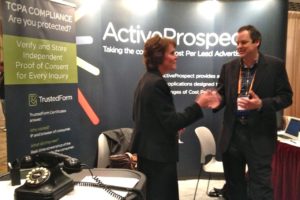FTC Warns For-Profit Education Sector at APSCU
The Association of Private Sector Colleges and Universities (APSCU) held their annual convention last week in Orlando, Florida. ActiveProspect exhibited at the conference (booth #537). While I spent most of my time at the booth, I was also able to attend the sessions to learn more about the latest issues affecting the sector.
The most significant session I attended was titled “Student Recruitment, Third-Party Vendors, and the Federal Trade Commission. The panel included Jonathan Pompan of Venable LLP and Lois Greisman of the Federal Trade Commission (FTC). While the comments of everyone on the panel were helpful, I’ve focused on the strong message sent by Lois Greisman in this post.

Lois was very direct in her comments. She said she has heard that schools have been slow to adopt independent third party lead verification services because lead sellers are pushing back. If that is true, why don’t the schools demand it? What is unique about the education industry that makes it more resistant to these types of solutions? In most industries the lead buyers have the power to enforce their requirements. She questioned that maybe the risk isn’t enough? She stated maybe the FTC needs to take stronger action…
A statement about stricter enforcement issued by an important regulatory official should be enough for the industry to take notice. It was clear to the folks in the room that the FTC might be taking additional action soon. The window of time to implement a best practice of self regulation and compliance is closing. The FTC has been looking for proactive change from schools. Lois clearly outlined FTC expectations:
Schools are responsible – even for their “rogue vendors”
Typically when a lead buyer gets into trouble about an illegal marketing tactic, they will blame the activity on a “rogue vendor.” It doesn’t matter. It is the school or lead buyer’s responsibility to ensure their marketing efforts are compliant.
Indemnification is not protection from the FTC
Lois warned that getting legal indemnification from your marketing vendors is not going to protect you from the FTC. Both the vendor and the advertiser benefitting from the advertising can be held liable for any misleading advertising. Lois gave an example of misleading advertising – Sketchers and Reebok settled for $40 million and $25 million respectively for making claims that their shoes strengthened and toned legs.
Lead buyers must take steps to ensure consumers are informed and protected.
How do you know that the consumer gave consent to be called? Who is going to call them? How many people are going to call them? You have an obligation to tell them who is going to contact them. Are the proper disclosures there? Schools need to understand the tactics used to generate inquiries. Go to the actual websites and follow the process that a consumer goes through. Listen to the call recordings. Lois said the FTC is going to have a master list of complaints from Dept of Veteran Affairs and Dept of Education.
Protect yourself with independent third party lead verification services.
Lois discussed the benefits of third party lead verification services that allow a lead buyer to independently verify when and where a consumer signed up. These services can capture real-time consumer session information including what the consumer actually saw when they signed up. (Obviously Lois can’t endorse a specific product but that sure sounded like a description of TrustedForm to me…)
Lois’ comments struck a chord with me, as I’ve always been surprised that the early adopters of TrustedForm were companies in completely unregulated industries. It’s been 3 years since we introduced the concept of lead certification when we launched the first version of TrustedForm. I assumed the early adopters of this technology would be the for-profit education sector, given the intense regulatory scrutiny of the past few years. Yet, that wasn’t the case. The first adopters of this technology were major brands motivated by a desire to protect their brand and ensure they were only contacting consumers that requested to be contacted. TrustedForm has now become a best practice for lead buyers across a wide range of industries.
While it’s nice that TrustedForm is currently getting a lot of attention in the for-profit education sector due to increased regulatory pressure and new TCPA rules, the best reason to use TrustedForm is that it is simply the right thing to do for students, schools, and the entire sector. There is still time to elevate industry standards to ensure better lead quality, improved sector image, and ensuring a better consumer experience. However, the window of time to change independently is closing. The for-profit education sector has been warned again…





